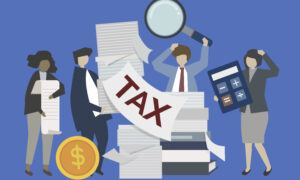
The last day to opt out or make adjustments to your Child Tax Credit advance payments was Nov. 29, 2021, so now you’ll have to sort out any errors in your 2021 tax return.
If you would like a refresher on the advance Child Tax Credit payments you can find that here.
How do I know how much my advance Child Tax Credit payments were?
The one piece of information you will need to make sure you get the full Child Tax Credit (including what you should have received in advance) for which you are eligible, is the total amount of advance Child Tax Credit payments you received.
The IRS is going to help with that. In January, the IRS will send out a Letter 6419 to every taxpayer who received advance Child Tax Credit payments. This letter will remind you to log into your IRS tax account and see how much the IRS said you received in Child Tax Credit payments. Keep this letter for your records, especially if you pay a tax professional to file a tax return. You can find out more about Letter 6419 here.
What if I received less in advance Child Tax Credit payments than I should have?
If you received less in advance Child Tax Credit payments than you should have based on your 2021 tax return, you’ll be able to get the remaining credit when you file your 2021 tax return in 2022.
The good news is that for most taxpayers, that will result in a bigger refund.
If I received more advance Child Tax Credit payments than I should have, will I have to pay it back?
It depends. There are several reasons you could end up with more payments than you should have.
Typically, the reasons would be a change in income, marital status, or number of qualifying children between the tax return used to calculate the advance payments (2020 or 2019) and the 2021 tax return. This is why the IRS provided a portal to make changes or to opt out of the advance payments.
If you have excess payments due to changes in income or marital status, then the Child Tax Credit must be paid back. If the excess payments were caused by a difference in the number of qualifying children, there is a safe harbor provision that MAY apply.
What is the safe harbor provision?
If you don’t have much income, you can take advantage of the safe harbor provision. When the safe harbor provision applies: If you have fewer qualifying children on your 2021 tax return compared to the tax return used to base your advance Child Tax Credit payments on.
For single filers that is less than $40,000/year, for head of household filers it is less than $50,000 per year, and for married filing jointly that is less than $60,000/year.
If your income is below that limit, then you don’t have to pay back the excess payments IF the excess was due to a difference in the number of qualifying children from the 2021 tax return compared to the previous tax return.
If your income is above the applicable limit, you may still avoid paying some, or in a few cases, all of the excess payments based on the number of qualifying children. There is a phase out range where as your income goes up, you are eligible for less of the safe harbor.
Generally speaking as your income goes up, the more you have to pay back. The phase out ranges are $40,000 to $80,000 for single, $50,000 to $100,000 for head of household, and $60,000 to $120,000 for married couples. Once your income reaches the top numbers ($80,000, $100,000, or $120,000) you’ll have to pay back all the excess payments.
How do I Pay Back the Excess Advance Child Tax Credit Payments?
The good news is that if you need to pay back excess advance Child Tax Credit payments, it can be done in 2022 when filing your tax return for 2021.
When you file your 2021 tax return, you’ll need to know how much your advance Child Tax Credit payments should have been with what they actually were. If your refund based on your other input is high enough, then the excess payments will be paid back by reducing your tax refund.
I project that most who need to pay back excess payments will get a lower refund than they otherwise would expect. However, some families will not have a refund and owe the US Treasury and have a tax bill to pay.
If you find yourself in the position of your tax return calculations indicating that you owe, you have a couple of options.
But first, a reminder for those who find themselves in this situation seek to delay by not filing a tax return. It is important to know that the Failure to File Penalty is much higher than the Failure to Pay Penalty. Filing the tax return on time is important when you owe, so even if you can’t pay, still file your tax return.
Here are some options if you owe:
- File and pay if you have the funds by the filing deadline (April 15, 2022).
- File and pay the amount you can pay (if any) and file Form 9465 Installment Agreement Request with your tax return.
- File your tax return and apply for a payment plan online at irs.gov.
Please remember that the IRS doesn’t forget. The sooner you come up with a plan when you owe the better. The longer it takes you to address owing the IRS money, the more penalties and interest that may be applied.
As of this writing, the advance Child Tax Credit payments are only for 2021. The current Build Back Better Act framework includes a continuation of the monthly Child Tax Credit payments in 2022. If these payments do continue, I encourage you to take this article as a lesson on the importance of managing these payments through the IRS Child Tax Credit Portal.


